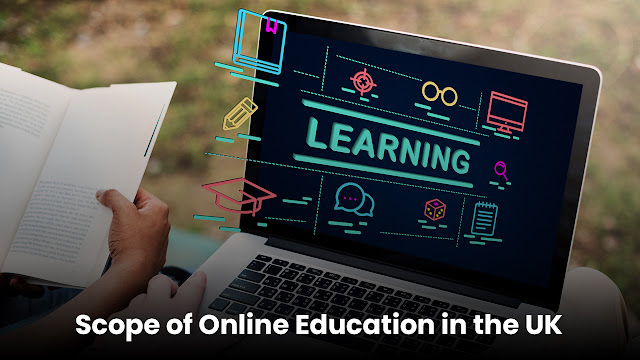Scope of Online Education in the UK
Online education, also known as E-learning; is a process of giving access to learning through a personal computer by providing material and resources with the help of appropriate technologies.
Therefore, it is characterised by:
· Use of computer network and internet to either present or distribute educational content
· Provision of two-way communication
· No requirement of self-study and private tutoring
The focus of online education is more on learning content than on communication between teachers and learners. Its primary goal is an improvement in productivity in secondary education.
Online education is growing and is here to stay in the UK. It is creating new opportunities for students, teachers and education institutes themselves. It has provided better access to education for many and will benefit more in the coming years. In recent years, various education institutes have shown interest in taking up online courses as a part of their regular course. Researchers have found that online classrooms are more productive and there is more focus on the subject being taught with less distraction, thus allowing students to learn effectively in their all subjects. Open education contributes to the further professionalisation of lecturers, through participation in both open courses on educational subjects and sharing of course materials.
As per the survey conducted in the UK, online collaboration tool software which supports paced learning individually, are expected to improve academics in coming years. Now with online learning, teaching will focus more on the outcome by applying knowledge to a particular problem. Textbooks will be replaced by online materials, and the teacher’s role will become more of a mentor than an instructor and assignments would be designed to increase the thought process among the students. The rise of an online review system would allow some teaching materials to permanently exist in virtual form, which could be updated and refined at any time. This will affect future academic offerings by increasing innovative research, student engagement and academic collaboration. In coming years, there would be more inter-university collaboration among various institutes in the UK, as well as, across the world.
Increased access to the web and digital technologies has given a new lease of life to many areas like broadcasting, publishing and social relation in the UK. Broadcasting connectivity has increased from 25% in 2005 to 95% in 2016 and the government has set a target of providing a high-speed network using 3G and 4G networks so that students can access online courses via their smartphones. Nevertheless, online delivery of higher education is still in its nascent phase and growing at a low rate in the UK education sector. According to a recent survey, UK online education courses are typically vocational courses delivered in the partnership between education institutes and specialists and often enrol students from the UK and across the world.
Today, online degree programmes and distance learning like Massive Open Online Courses (MOOC’s) have gained wide momentum around the universities of the world. MOOC’S are open online courses that can be accessed free of cost. They have developed rapidly since 2008 in the UK deliver higher education in a new and innovative way. The courses are based on a variety of online resources like videos and message boards and seek to capitalise high volume of students by providing recorded lectures and notes to the student.
Moreover, they encourage them to pursue online learning networks in place of traditional learning and the academic model of the education system. They might be developed either independently by academics or by third party online platforms through a contractual agreement with education institutions. This has enabled the students to access high-quality academic content and to engage with a wider audience. MOOC’s have expanded in recent years, on major online platforms and offers hundreds of courses to millions of registered users. MOOC’s are being explored across universities in the UK to capitalise on low prices and flexible modes of learning. It enables students to engage with academics and help them to meet the demand for career opportunities and provide institutes to provide all-around developmental education to their children.
MOOC’s might help to lower the education cost and restructure it to attract learners looking for lower cost provision and provides institutes to develop free user model by changing institutional strategy such as the development of shared educational services through licensing and reciprocal arrangement. This mode of flexible, free and accessible model delivered through the online platform using broadcast and distributed peer learning represents a new relationship between students, institutions, academics and technology firms. There are various platforms like Coursera, edX, Udacity and Futurelearn which provides online courses in various educational organisations in the UK.
Analysis conducted by a renowned company found that in the UK, investment in providing online learning has increased from $ 200 million in 2008 to $ 900 million in 2012. In addition to the MOOC’s, investment is also made in providing education via software firms through adaptive learning systems based on digital learning tools like e-textbook and virtual learning platforms. In 2012, leading educational universities like Edinburgh University and the University of London, signed a pact with Coursera to provide online certification courses.
Finally, online learning has created an opportunity for working persons also to get quality knowledge in their respective fields and certified them to increase their prospects of securing their future bright. Furthermore, these certification programmes have allowed students to access practical knowledge about their respective fields and hone their skills to survive in this competitive environment.
Thus, with great access to e-learning, the UK education system is on the path of going virtual in providing online-based education to students, as well as, job-seekers which would benefit not only students; but also their teachers and education organisation in providing quality education so that students may get prepare for industries and other jobs and secure their future in an effective way which would benefit the country the most.


.jpg)


Comments
Post a Comment